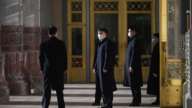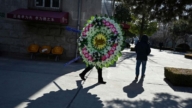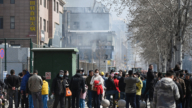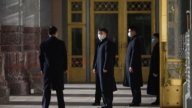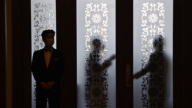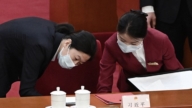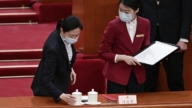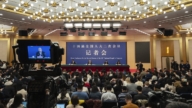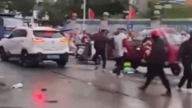【新唐人2012年3月6日讯】一年一度的中共政协,人大两会刚刚召开。与往年相同的是,由中共组织推荐的党内人士垄断的各地人大代表纷纷进京。但与往年不同的是,就在两会前,备受关注的广东省乌坎村刚刚完成了村委会的直接选举。乌坎村直选的完成,无疑给人大再次提出:“为何目前不能实行各级人大代表直接选举?”
人大发言人李肇星3月4号声称,中国地域辽阔、人口众多,经济社会发展不平衡,有些地方交通不便,一律实行直接选举还有困难。
李肇星的说法受到学者和网民的反驳。美国“中国反政治迫害同盟”主持人刘因全认为,这些理由都不成立。
美国“中国反政治迫害同盟”主持人刘因全:“代表应该是直选的,应该通过竞选,不应该他们指定。就应该由老百姓来直接选出。这样呢,他们直选就不存在什么交通问题,也不存在什么地域辽阔不辽阔问题,那些都是不成立的东西。”
而网民纷纷发问,既然地方人大代表可以人手一票选出来,为什么放大到全国就不行?如果交通不便是理由,那么北京,上海等交通便利的城市为什么也不能直选?和中国一样幅员辽阔,地方经济发展不平衡的俄国、印度等都可以直选总统,中国为什么不可以?
根据现行的《选举法》,中国全国人民代表大会的代表,省、自治区、直辖市、设区的市、自治州的人民代表大会的代表,由下一级人民代表大会选举,不设区的市、市辖区、县、自治县、乡、民族乡、镇的人民代表大会的代表,由选民直接选举。
但是实际有参选经验的人表示,目前实施的地方人大代表直选被地方官员破坏,没有依法进行。
前“山东大学”教授孙文广,2011年11月以独立候选人身份,参加济南市历城区人大代表选举,遭到当局监控打压。
前“山东大学”教授孙文广:“那我们很多人参加人大代表选举,去年的选举。他根本就不给你提名啊,提名他就给你卡住。而且派个警察来选举,把我关在房间里不让我出去。”
去年参与了北京市昌平区人大代表选举的律师程海也向媒体表示,地方官员在地方人大代表直选的实际操作上严重违法,具有普遍性。受到选举机关的限制,代表大家利益的候选人出不来,因此更高层的人大代表们的代表性无法得到保证。
刘因全认为,中共最主要的问题不是用哪种选举形式。
刘因全:“形式都是无所谓的,你搞人民代表大会制也可以,是它的本质,它本质上一直没有搞真正的那种选举,它是走过场,就是共产党推出候选人来啊,然后大家走过场。我们应该批评的,应该反对的,不是它的人民代表大会制,而是这种虚假的这种走过场的民主。”
孙文广:“根本问题就是共产党要坚持一党专政,要垄断权力,要垄断官员的任免的权力。”
“深圳大学”政治学教授张涛也向媒体指出,关键问题在于中共高层选择不选择直选。如果它愿意选择,那李肇星给出的理由就不是理由。在技术上完全可以针对国情来设置对应。
新唐人记者朱智善、尚燕、李若琳采访报导
Why People’s Representatives Can’t Be Elected?
The annual two sessions – Chinese Communist Party (CCP)
Political Consultative Conference and the National People’s Congress (NPC) were recently held in China.
As usual, people’s representatives there were CCP members,
and were recommended by the CCP authorities.
However, just before the Two Sessions, Wukan Village
in Guangdong completed its direct elections of committees.
Wukan’s direct election posts a question to the NPC again:
“Why direct elections cannot be implemented
at each level of people’ representatives.”
NPC spokesman Li Zhaoxing spoke on March 4,
on the issue of direct elections.
China’s vast territory, large population, unbalanced economic
and social development,
and poor transportation in certain areas
make direct elections difficult to implement, said Li.
Li Zhaoxing statements were refuted
by scholars and netizens.
U.S. Anti-Political Persecution Alliance of China host,
Liu Yinquan thinks these are not established reasons.
Liu Yinquan: “Representatives should be elected directly.
It should not be designated to them.
People should directly elect
their representatives.
Direct election doesn’t involve traffic problems, nor it has to
do with how large the territory is. Those things are unrelated.”
Netizens ask why NPC representatives cannot be voted
across the country?
If traffic inconvenience is a reason, why it is not implemented
in cities with good traffic system, like Beijing and Shanghai?
India and Russia are vast countries with imbalanced local
economic development, but have directly elected president. Why can’t China?
The current Electoral Law requires people’s representatives
of China’s NPC, provinces, autonomous regions and municipalities to be directly under the Central Government.
Cities with districts and autonomous prefectures are
elected from people’s representatives of lower levels.
NPC’ representatives of cities without municipal districts,
counties and townships are directly elected by voters.
Those with election experience expressed that direct election
of local representatives was destroyed by local officials and it is not being implemented according to the law.
Former Shandong University professor Sun Wenguang was
monitored and suppressed by the authorities for this.
He participated in elections of Licheng District in Jinan City
as an independent candidate in November, 2011.
Prof. Sun: “Many of us participated in the people’s
representatives election last year.
They did not bring up our names at all. They sent police
and locked me up in a room. I could not go out.”
Lawyer Cheng Hai joined NPC representatives’ elections
of Changping District, Beijing last year.
Cheng told the media, it is common for local officials
to violate the law during local NPC direct elections.
Limited by the election system, representation of people
at the highest level of NPC cannot be guaranteed.
Liu Yinquan thinks the key issue of CCP
is not which election way to use.
Liu Yinquan: “Formality is meaningless.
They can have the NPC system.
Its nature, however, is not real election,
but a formality.
People simply follow the formality to vote for those
candidates recommended by the CCP.
What we criticize or oppose is not the NPC system,
but its fake system of democracy.”
Prof. Sun: “The fundamental issue is CCP’s one-party
dictatorship and monopolizing power, especially the power to assign and dismiss officials.”
Shenzhen University professor of Political Science,
Zhang Tao commented on the topic to the media too.
Prof. Zhang pointed out that the key issue lies in
whether the CCP high-level chooses direct elections or not.
If the CCP wants direct elections, Li Zhaoxing’s reasons
are not valid and can be addressed based on each situation.
NTD reporters Zhu Zhishan, Shang Yan and Li Ruolin



